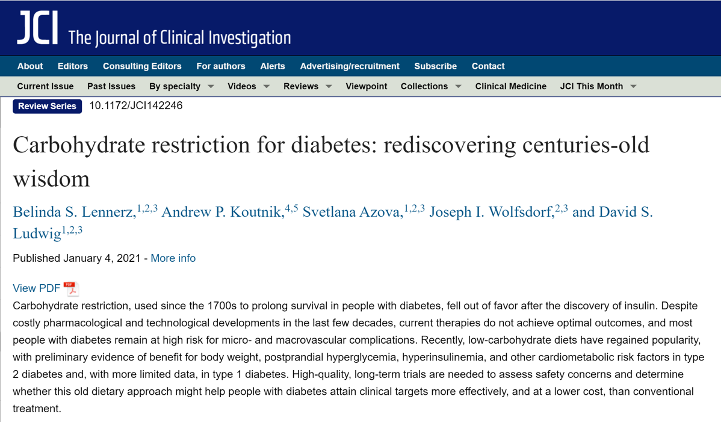Carbohydrate restriction for diabetes: rediscovering centuries-old wisdom
Over a century ago, carbohydrate restriction was a (and in many cases, the) means of extending the life of a newly diagnosed patient with Type-1 Diabetes. Then, there was only days, weeks, or months (sometimes years) to live (read more here). The scientific and clinical community did not completely understand the disease, merely the symptoms. There were not the advancements, most notably exogenous insulin, to manage this loss of endogenous insulin production, and then ultimately the disease. Now we have over ten forms of exogenous insulin, multiple automated insulin delivery systems and continuous metabolite monitoring technologies, and an array of metabolic pharmaceutical interventions which have improved the lives of those living with this disease (read more here).
Upon diagnosis of any disease, we can only hope that there is access to tools that allow for the management and subsequent resolution of your disease. However, for the patient or family who walks into the emergency room with symptoms of frequent urination, vomiting, dehydration, thirst, and lethargy and walks out with a life changing diagnosis of Type-1 Diabetes, this remains an elusive goal. A goal which many believe is not coming anytime soon. Patients with Type-1 Diabetes remain at increased risk for acute and chronic complications with a reduced life expectancy reported to range between 11-18 years. The average HbA1c remains approximately 8.0% (normal <5.7%). Notably, even with advanced technologies and pharmaceuticals, chronic metrics of glycemic control indicate that this has worsened on average in the last decade. Many patients, including myself, hope that a cure comes one day and that articles like this were merely a moot point. However, it appears unwise to place hope into these next generation scientific advancements to fix the problems patients with Type-1 Diabetes are currently living with every day. Until that day comes, we will be continuing to look for ways to improve the lives and outcomes of those living with Type-1 Diabetes. I do believe there is hope. The data says there is.
For the 100th year anniversary of the discovery of insulin, Belinda Lennerz, myself, Svetlana Azova, Joseph Wolfsdorf, and David Ludwig discuss “Carbohydrate restriction for diabetes: rediscovering centuries-old wisdom.”
· The history of carbohydrate recommendations for diabetes
o Early Insulin Era
o Evolution of Modern ADA dietary Guidelines
o Trends in Glycemic Control and Technological Developments
· The rationale for historical and current carbohydrate recommendations for diabetes
o Rationale
o Carbohydrate Quality
o Carbohydrate Amount
· Carbohydrate reduction in Type-1 Diabetes
o Review of moderate, low, and very-low carbohydrate diets
Study
Design
Setting
Population
Diet Time
HbA1c
Insulin
Lipids
o Address safety concerns for very-low carbohydrate diets
Hypoglycemia
Ketoacidosis
Cardiovascular Disease Risk
Nutritional Insufficiency
Growth
Others…
· Economic considerations of carbohydrate restriction in the 21st century
Due to the inextricable link between carbohydrates and glycemia, glycemia and overall Type-1 Diabetic health, the inability to regulate glycemic control effectively (worsening) with any other known therapeutic strategy even with a multitude of pharmacologic and technological advancements, and the very-low carbohydrate diet (<50g/day) being the only dietary strategy which has repeatedly demonstrated the ability to normalize HbA1c into the non-diabetic range, lower insulin load, reduce glycemic variability, amongst other effects, maybe it is time to revisit the age old wisdom of carbohydrate restriction in Type-1 Diabetes?



